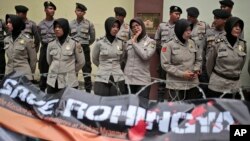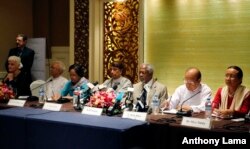It’s a scene straight out of Myanmar’s dark past: a military offensive waged beyond world view that forces ethnic minority villagers from the smoldering ruins of their homes.
The U.S. government, a key sponsor of Myanmar’s democratic transition, says a security crackdown that has displaced tens of thousands Rohingya Muslims and left an unknown number dead risks radicalizing a downtrodden people and stoking religious tensions in Southeast Asia.
The military moved in after armed attacks by unknown assailants on police posts along the border with Bangladesh in October. The attacks in Rakhine State were a possible sign that a small number of Rohingya were starting to fight back against persecution by majority Buddhists who view them as illegal immigrants although many have lived in Myanmar for generations.
U.S. urges less violence
The top U.S. diplomat for East Asia, Daniel Russel, is critical of the military’s heavy-handed approach and says the escalation of violence risks inciting jihadist extremism in the country also known as Burma. He is also calling on neighboring countries, such as Muslim-majority Malaysia and Indonesia, to resist the urge to stage protests that could further stir religious passions.
“If mishandled, Rakhine State could be infected and infested by jihadism, which already plagues neighboring Bangladesh and other countries,” Russel said.
The plight of the Rohingya, once characterized by the U.N. as the world’s most friendless people, has attracted the attention of Muslim extremists since a spike in intercommunal violence in Rakhine in 2012 that left hundreds dead and forced more than 100,000 into squalid camps.
The Somali-born student who launched a car-and-knife attack at Ohio State University this week reportedly protested on his Facebook page about the killing of minority Muslims in Myanmar. And last weekend, Indonesian authorities arrested two militants who were allegedly planning to attack the Myanmar Embassy in Jakarta.
It has also raised hackles in the political mainstream. Malaysia’s Prime Minister Najib Razak, facing domestic pressure over an investment fund scandal, is reportedly planning to attend a protest in his religiously moderate country this weekend condemning the military operation in Myanmar.
Rohingya people fleeing
Daniel Sullivan at the advocacy group Refugees International said increasing numbers of Rohingya are fleeing across the land border to Bangladesh, and the spike in violence could set off another exodus by sea.
Tens of thousands of Rohingya have fled by rickety boats in recent years to countries like Thailand, Malaysia and Indonesia, but those routes have been blocked since a crisis in 2015 when thousands were stranded at sea.
The U.S. and other nations have called for an independent investigation into the latest violence in Rakhine. Estimates of the death toll range between dozens and several hundred. Human Rights Watch said Nov. 21 that satellite imagery showed at least 1,250 buildings have been destroyed.
With journalists barred from the affected area, it’s been near-impossible to substantiate reports of rapes and killings by Myanmar soldiers — the kind of conduct that has long blighted the military’s reputation in ethnic conflicts.
Adama Dieng, U.N. special adviser on the prevention of genocide, said this week that if reports of excessive use of force in Rakhine were true, “the lives of thousands of people are at risk.”
Former U.N. Secretary-General Kofi Annan was appointed by Myanmar’s civilian leader Aung San Suu Kyi in August to find ways to help resolve the communal tensions. On a fact-finding visit Friday, he said that security operations must not impede humanitarian access.
The U.N. World Food Program said Friday that since October 9 it has been able to deliver food or cash to only 20,000 of the 152,000 people who usually receive assistance, and to about 7,000 newly displaced people.
The Obama administration has diminished leverage. It was instrumental in ending the former pariah state’s diplomatic isolation as it shifted from five decades of military rule but the last U.S. sanctions were lifted in October.
The military’s crackdown in Rakhine has also exposed the limits of Suu Kyi’s power. The Nobel laureate’s party won elections a year ago, but the military still controls key levers of government power, including access to sensitive border regions.
Human rights activists who once lionized Suu Kyi now criticize her for failing to defend the stateless Rohingya, but Russel defended her.
“We all should have confidence in her judgment and not fall prey to the idea that she does not get it and she does not care. She does get it, and she does care,” he said.






